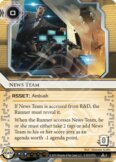Hive is arguably the second best Weyland ice in the game, and is a strong include in nearly every Weyland deck.
"But it's expennnnnsive!" "But it has a drawwwback!"

No. No. Shut up. No.
Hive is the best rush ice in the game.
Little Engine can give it a run for its money (heh), but it's in the wr... (I'm sorry, can we just take a second to appreciate that double pun?) ...rong faction. Chimera is a neat little trick, but there's actually a lot of opening hands that can slap her down. ...Phrasing.
- A turn-1 Corroder steal requires them to get 3's in their remaining 2's, and also to faceplant into a turn-1 unrezzed ice with just a Corroder out, probably on their last click (they probably shouldn't do this)
- A turn-1 Faust steal requires them to do the following:
- 1: Install Faust
- 2: Draw
- 3: Draw
- 4: Run and discard their entire hand
Both of those plays are either incredibly stupid, incredibly lucky, or both. Inside Job is a "welp", but don't do this against criminals you idiot.
More often than not, Green is the "rush" ID, and even if you aren't rushing, you're still probably relying heavily on powerful cards like Archer (she's clearly Hive's better half) and Corporate Town, both cards that require you to at least score one agenda before they can take hold. Scoring early in Weyland is a bit like scoring an early Astro in NBN - it truly sets the pace for the rest of the game. Nothing (besides fast-advance) lets you secure that first agenda quite like Hive does.
Let's address the elephant in the room, though. Hive is clearly designed to be overpowered in the early game, and then become crappy as the game goes on (it's kind of like the "bad pub" of ice). Luckily, Weyland is the faction best able to shovel that crap into the neighbor's yard.
- Use it to protect cards that swing the early game hard in your favor
- Assets like Melange Mining Corp, Capital Investors, or The Root
- Score out agendas like High-Risk Investment, an over-advanced Project Atlas, or (ideally) This Ridiculous Card
- Recycle it with Blue Sun, or make one of the most brutal plays in the game by rezzing an Archer in front of it and turning those subroutines back online (Corporate Town can do this too)
- Using your buckets of credits, your EASY Atlas tokens, or just a very broke and overextended runner, proceed to Do What Weyland Does Best:

Finally, I'd just like to point out that even after scoring a 2-pointer, Hive is still as cost-efficient as a Spiderweb. If you score to 4 and then close out the game with a 3 pointer, Hive is doing work for you all game.




